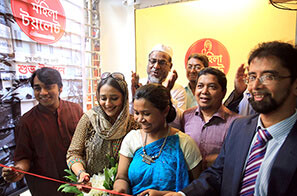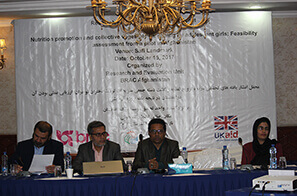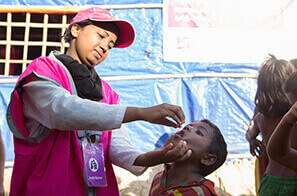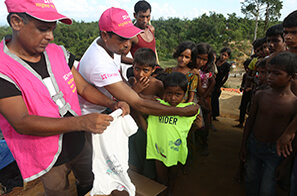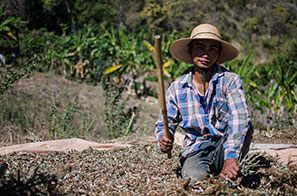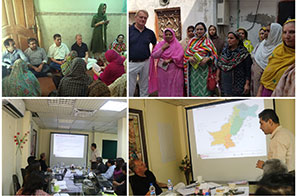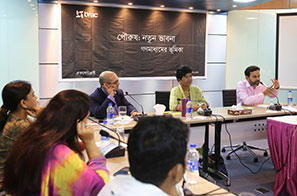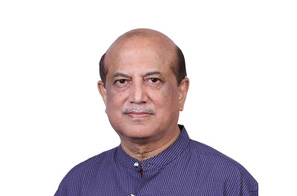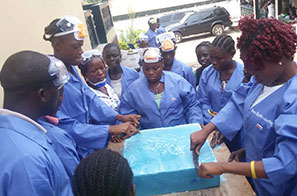
BRAC
Advanced and Secure Toilet Facilities for Women in Dhaka
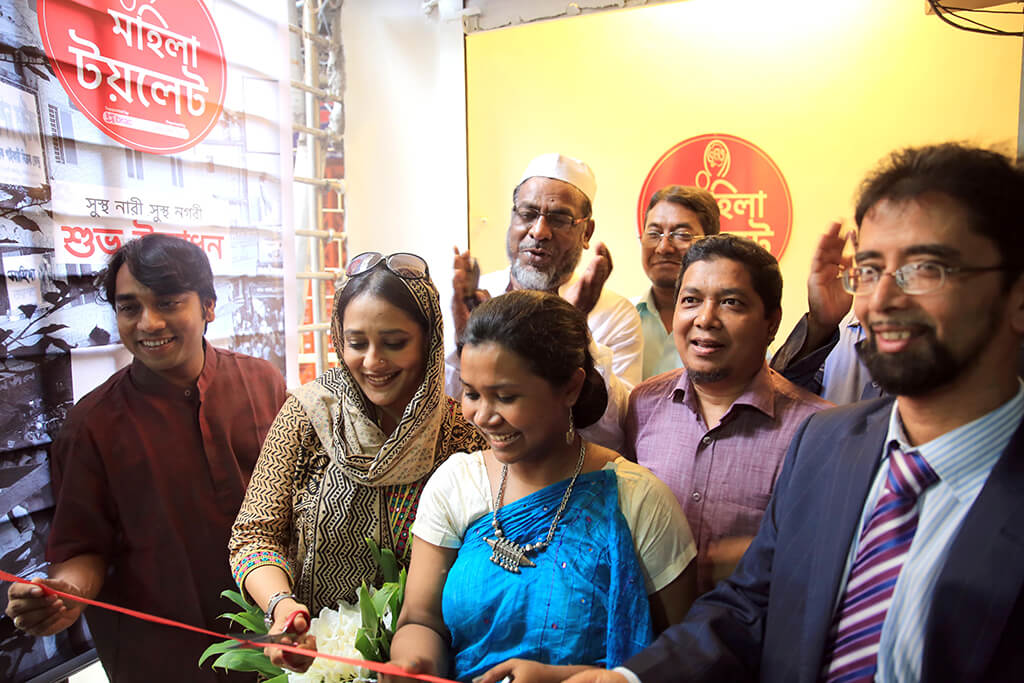
"Healthy women, healthy city" - this is the slogan used to launch Dhaka's first modern, sanitary and safe toilets specifically targeting women. The official inauguration of the first toilet, located on the third floor of Noor Mansion in Gawsia Market, took place today afternoon, Thursday (19 October, 2017), with renowned actress and architect Aupee Karim cutting the ribbon. Dr. Foysol Chowdhury, Director of Innovation at BRAC, was present at the time along with the area's leading business owners.
Only women will be able to enjoy the facilities of these toilets. To ensure security, two women staff will be on standby from day till night. In addition to them, a cleaning worker will be available at all times. To maintain cleanliness and prevent waterlogging, only the best materials have been used for the toilet. With a funding of around BDT 500,000 from BRAC, a social enterprise called Bhumijo has implemented the pilot project. With cooperation from Dhaka City Corporation, the renovation of the market's toilet was carried out to achieve such a result.
Aupee Karim stated that, "being able to participate in such a unique initiative gives me great joy. I hope that those who are using and those who are maintaining this facility remain properly accountable."
"BRAC has been working on women's rights and safety from the very beginning. With support from the communities, we will be able to scale the solutions across the city," said Dr. Foysol Chowdhury.
The organisers have stated that 32 locations have been chosen to build similar facilities keeping various factors in mind. These locations include Gawsia, New Market, Farm Gate, Moghbazar, Malibagh, Mouchak, Uttara and Mirpur among others. The toilet and its facilities will be open for service from 10 am till 9 pm at night. Currently individuals will be charged a fee of BDT 10 for using the toilet.
Bhumijo's Co-Founder Farhana Rashid mentioned that a survey of 200 people was conducted between 2016 and 2017. The results revealed that 80 percent of the women did not drink water before leaving their homes out of fear from using public toilets.
Further research also revealed that Dhaka city will need three thousand more toilets by 2020.
BRAC in Afghanistan releases research findings

BRAC in Afghanistan organised a research dissemination event at Kabul on 15 October 2017. The event revealed the finding of a study titled Nutrition Promotion and Collective Vegetable Gardening by Adolescent Girls: Feasibility Assessment from a Pilot in Afghanistan.
The event was inaugurated by Siddique Ali, the manager of the education programme for BRAC in Afghanistan. Ali introduced the audience to our activities in Afghanistan and encouraged them to participate in discussions to identify agricultural solutions to address malnutrition in Afghanistan.
40.9% of children under five in Afghanistan suffer from stunting according to the European Commission.
The study was conducted on the Leveraging Agriculture for Nutrition in South Asia (LANSA) project where we trained 200 out-of-school girls from our adolescent reading centres on summer and winter home gardening cultivation techniques. We also provided information on the importance of nutrition and vegetable consumption to these girls.
Abdul Alim, the head of research in BRAC in Afghanistan, presented the methodology and study findings. The respective panel consisted of Haroon Rashid, the research director of Sayara; Nemaitullah Akbari, a freelance consultant and Roqiya Azimi, the executive manager from the Ministry of Agriculture, Irrigation & Livestock in Afghanistan (MAIL).
Project participants also joined in on the discussions. Khadija, an adolescent girl from Kabul, highlighted that the project trained them in agriculture and once they started getting the harvest, the community’s view towards girls’ working in the field changed in a positive manner.
MAIL officials commended us for our innovative project and suggested for future collaboration with the ministry in women empowerment and agriculture projects.
The research report will be published as a working paper from BRAC in Afghanistan.
BRAC immunises over 167000 from Cholera in Ukhia and Teknaf
 90 member team helps cover 30 percent of the target population
90 member team helps cover 30 percent of the target population
The world’s second largest oral vaccination campaign, led by the Ministry of Health, ended yesterday on a highly successful note. With a target set to immunise 650,000 people in Cox’s Bazar, the joint efforts of both public and private aid providers helped exceed the reach to 679,678 individuals.
In addition to the children arrived from Myanmar, BRAC is also making an effort to provide health treatments for host community children. These initiatives are being taken to ensure the prevention of widespread diseases. BRAC has administered over 167000 individuals with oral cholera vaccinations. Aside from that, 1,53000 medical services have been provided that includes treatment for fever, pneumonia and diarrhoea.
BRAC is providing the health care services through 60 mobile health camps and 10 fixed camps. Access to safe water has been provided to 276,700, access to sanitation has been provided to 401000, 12,000 children were supported through child-friendly spaces and 50,000 Households were provided with critical supplies and non-food items.
Over 700 BRAC employees from around the country are fully mobilised to provide aid services. Their activities are mainly focused on ensuring necessary healthcare, safe water, sanitation and hygienic materials as well as safe spaces for women and children. These interventions are being conducted in collaboration with the International Organisation for Migration (IOM), UNICEF, WFP, AUSAID, DIFD and Global Fund.
To know more about our work please visit response.brac.net
78,000 new clothes to children from Rakhine State of Myanmar
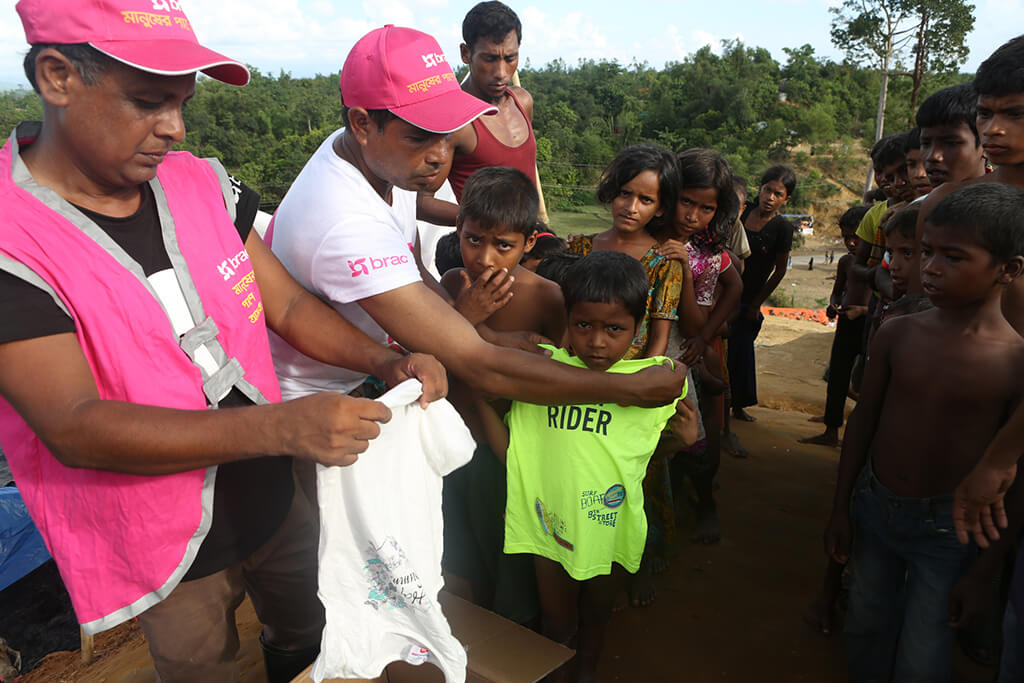
The humanitarian organisation has gathered clothing items for the children living across 10 makeshift settlements in Ukhia and Teknaf. So far the clothes have been distributed to 1000 children in these settlements as efforts continue.
In addition, floor mats have been provided to protect around 1700 families in need from the cold. Close to 345 families have been equipped with solar lights in order to keep the settlements well-lit at night.
More than half of the people that have arrived from Rakhine State are children, and during such crises they tend to be easily deprived of basic necessities like clothing. This has resulted in the children being exposed to severe health risks such as pneumonia, fever, coughing etc. This is why BRAC has mobilised a huge amount of clothing from multiple garments manufacturers to distribute amongst the children.
Apart from several individual donations, five large garments manufacturers including Hamim Group, Graphics Textile, Ecotex Limited, Fakhruddin Textile Mills and Saturn Textiles. On the other hand, SF Denim Apparels Limited donated clothes through Aarong.
Meanwhile, around 56 child-friendly spaces (CFS) have been established to ensure positive mental growth for more than 3000 children on a daily basis through playful events.
Over 600 BRAC workers from across the country are engaged in various aid efforts. They are currently operating 60 mobile health camps that serve a total of 70,429 people, have placed 876 tube wells and built 2,760 latrines around the settlements. These interventions are being carried out in collaboration with International Organisation of Migration (IOM), UNICEF, WFP, AUSAID, DFID and Global Fund.
Top management officials from BRAC are regularly conducting visits and overseeing on-site operations. For those who are interested, visit response.brac.net and find out how to contribute to the cause.
Reinventing microcredit in Myanmar
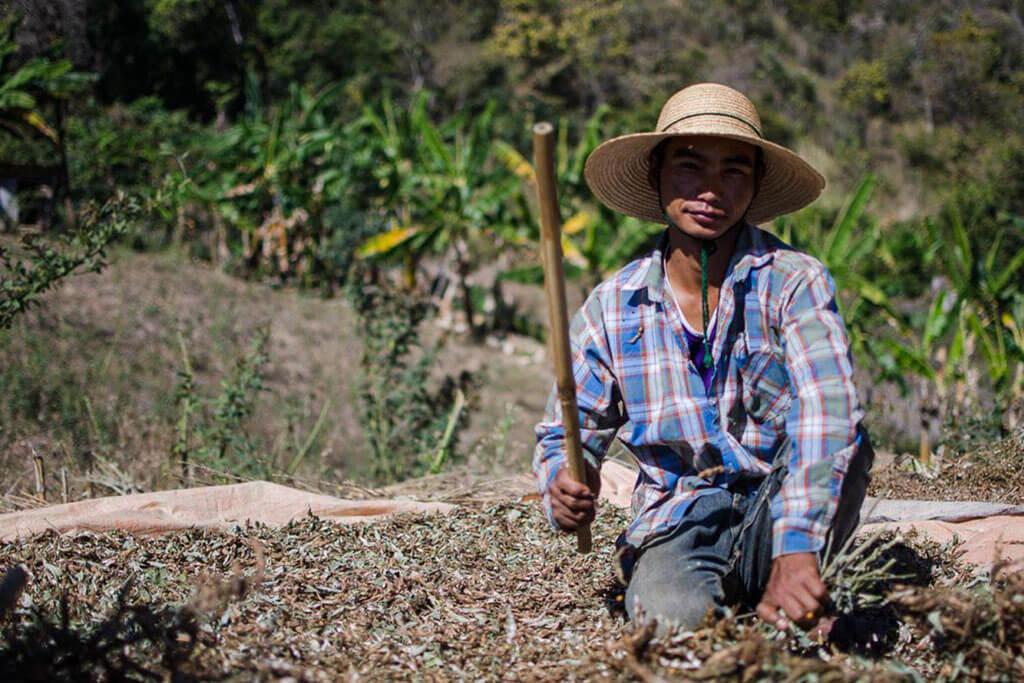
Microcredit is booming in Myanmar. After the first regulations for the sector appeared in 2012, microfinance institutions (MFIs) have mushroomed in the country. Providing small loans before was limited to a couple of NGOs and the Myanmar Agricultural Development Bank, leaving a large part of the demand unmet. Out of Myanmar’s ca. 50 million population, 2.5 million working-age adults still cannot access formal financial services such as loans or saving facilities, according to the United Nations’ capital investment agency UNCDF.
A reality that stands in stark contrast with the skyscrapers and shopping centres of uptown Yangon, as lustrous as they come in Western Europe. After decades of military protectionist government, the country has gradually liberalised since 2010, when releasing Aung San Suu Kyi from house arrest and partially handing over power to a civilian government. Major infrastructure works and foreign investments have started. Now the IMF puts the country among the fastest growing economies in the world.
Hans Eskes visits BRAC in Pakistan
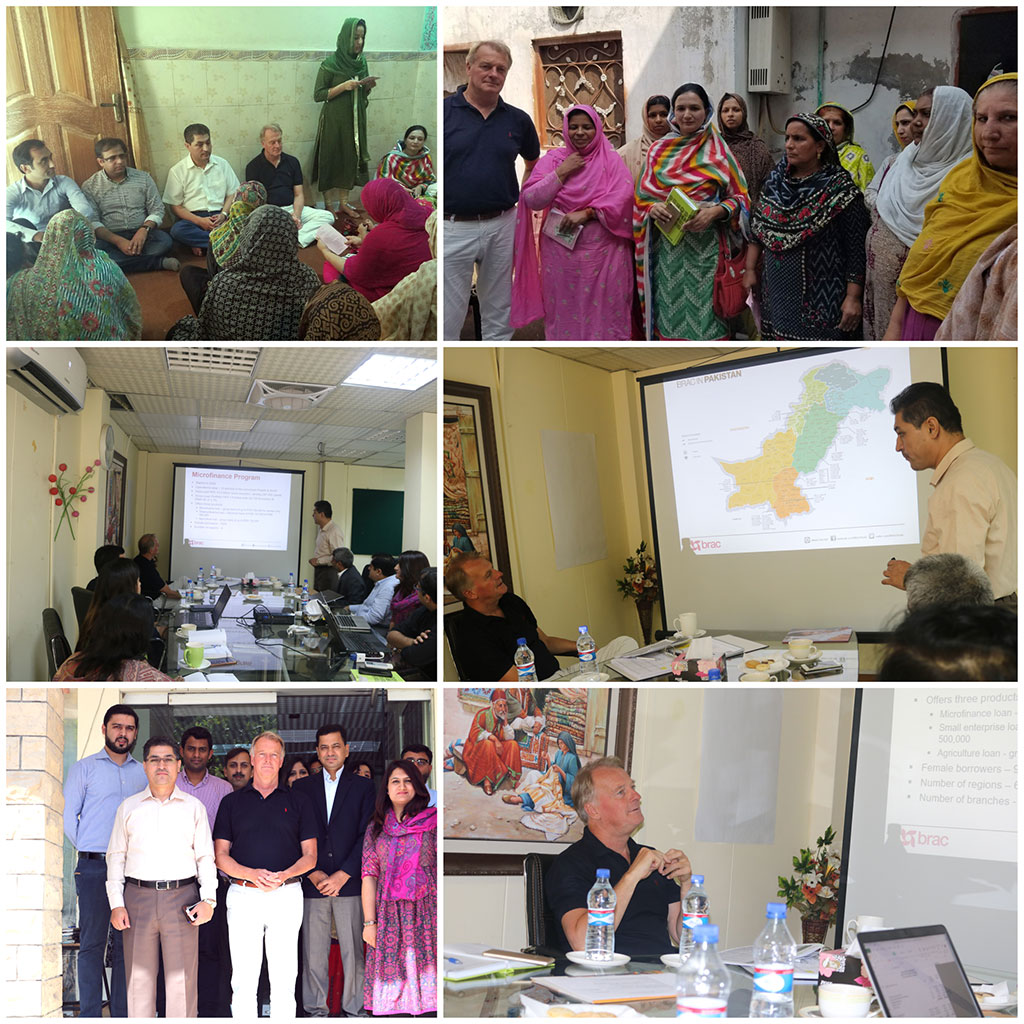
Hans Eskes, the managing director of BRAC International Holding BV, visited BRAC‘s operations in Islamabad, Rawalpindi, Lahore and Karachi from 18 to 24 September 2017.
Eskes discussed BRAC’s structure and the role of Stichting BRAC International and BRAC International Holding BV in its operations with the country management team. He was briefed about BRAC’s operations in the different provinces.
Eskes went on field visits where he interacted with BRAC’s clients from the microfinance programme in Rawalpindi, Lahore and Karachi. BRAC in Pakistan has served 247,000 borrowers with USD 14 million since inception.
He also met with BRAC’s partner organisations in Pakistan and the chairman of the country advisory board. The regional teams briefed him about their programmes, achievements so far and growth plans.
BRAC in Pakistan is currently operating 4,843 community-based village organisations.
They have also established ten Market Exchange Centres, each consisting of five shops to assist clients in developing market linkage, branding and promotional activities.
Eskes suggested leveraging and mobilising international Pakistanis living in the UK and the USA for donating funds to BRAC for development projects in Pakistan. He expressed a keen interest about the use of digital media like smartphones by field staff and clients of microfinance programme.
Safe drinking water for more than 1 lakh people in Ukhia and Teknaf
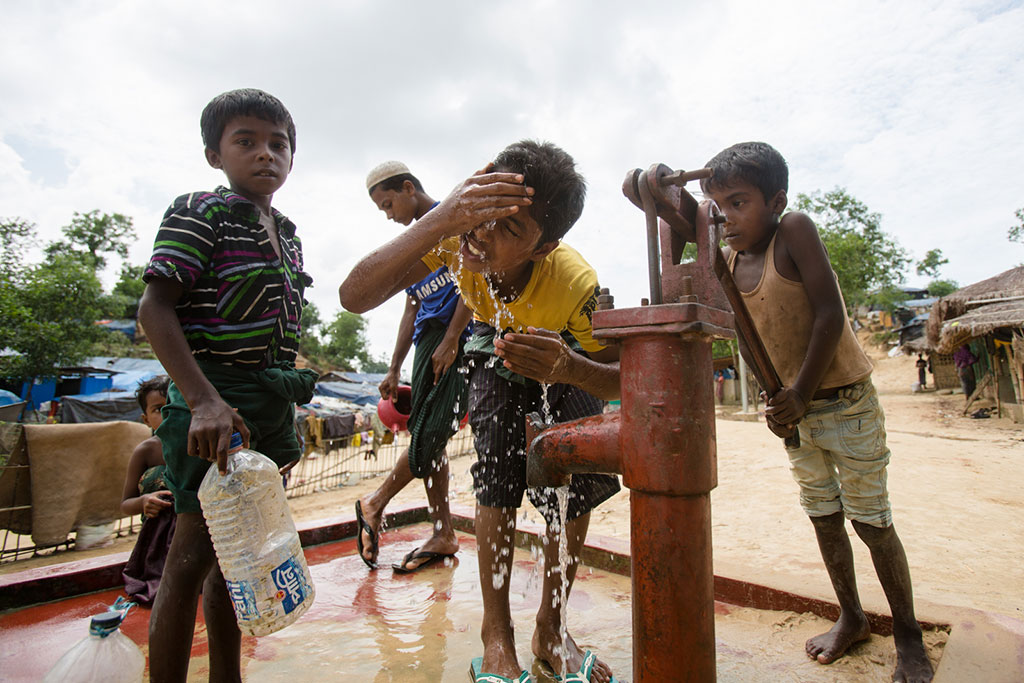
BRAC installed 392 tube-wells up to yesterday Tuesday (26 September) in 10 shelters in Ukhia and Teknaf upazilas of Cox’s Bazar for the distressed people arriving from the Rakhaine state of Myanmar. Besides these, 765 latrines have also been built for the use of 30,600 people.
A total of 1 lakh and 352 (100,352) people will be able to access safe drinking water from these tube-wells.
BRAC targets to install 15 thousand latrines and 1120 tube-wells by 15 October.
Mobilised from the branch offices across the country, more than 400 BRAC staff are running its emergency humanitarian aid programme in Cox’s Bazar.
BRAC’s programme in this regard is covering three areas, namely emergency healthcare focusing on women and children, ensuring potable water and sanitation through installing tube-wells and latrines and supplying hygienic materials, and ensuring protection of children through creating safe spaces.
These activities are going on in coordination with and with assistance from International Organisation for Migration (IOM), Unicef, World Food Programme (WFP), AusAid, DFID and Global Action.
BRAC has also opened 56 mobile health centres and provided immediate healthcare to 25,703 patients till Tuesday (26.09.2017). A total of 23,992 patients have received treatment for diarrhoea, fever and other complaints. Tuberculosis diagnostic tests were carried out for 260 patients of whom 17 have diagnosed with the infection. Malaria has not been diagnosed in any of the 1451 patients for whom malaria diagnostic tests were carried out. A total 954 packs of sanitary napkins were distributed. By next week 10 maternity centres will be operational for pregnant mothers.
Over half of the arriving Myanmar nationals are children. BRAC has so far opened 24 child-friendly spaces for these children where they can engage in recreational activities. Children are receiving nutritious biscuits also at these centres.
BRAC’s senior management officials are making regular inspection visits in Ukhia and Teknaf.
Redefining Masculinity: Men must take lead in tackling violence against women
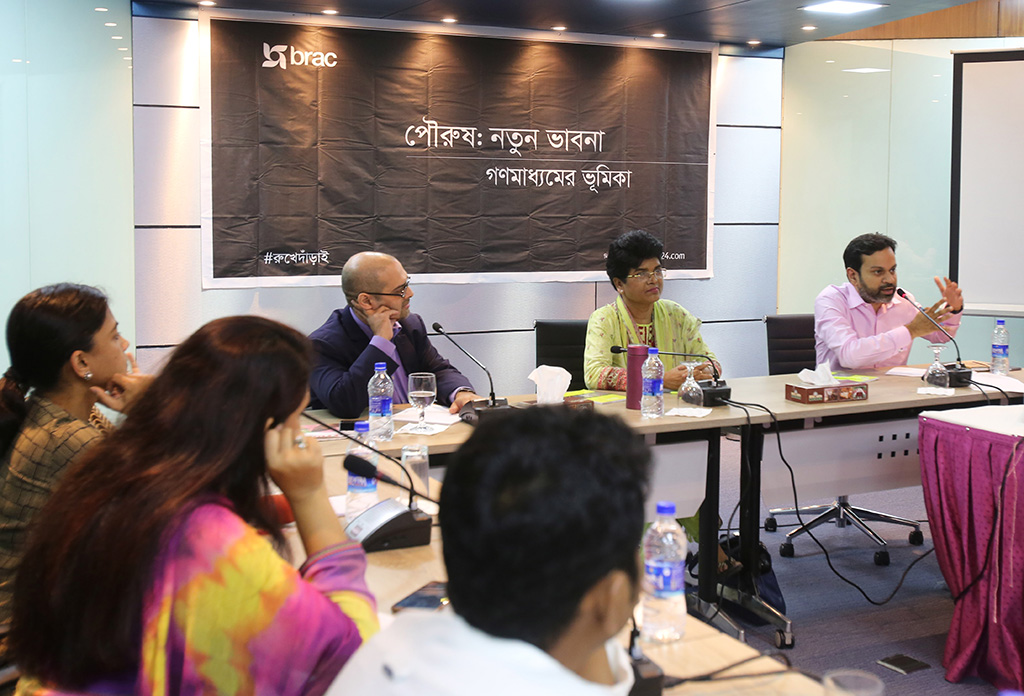
A pervasive culture of impunity is mostly responsible for the recent increase in sexual violence and other forms of crimes perpetrated against women. Exposure to online content provoking sexual abuse of women and children, strong social and religious values against gender equality and a lack of strong voice among males against such incidents are also responsible for the rapid increase in incidents of violence against women.
Speakers came up with these observations at a sharing session titled 'Redefining masculinity' organised today on Saturday (9 September 2017) at the BRAC Centre in the capital. The event had among its speakers Syed Ishtiaque Reza, director of news, Ekattor Television, Jafar Sobhan, editor, Dhaka Tribune, Nabonita Chowdhury, editor, DBC TV, Supriti Dhar, editor, online portal Women Chapter, and Towhida Shiropa, staff reporter, Prothom Alo. Asif Saleh, senior director, strategy, communications and empowerment, BRAC, moderated the discussion.
Actors Rafiath Rashid Mithila and Iresh Zaker, blogger-activist Arif Zebtik, BRAC Gender Justice and Development programme's director Anna Minj also spoke at the event. Online news portal bdnews24.com was media partner of the roundtable.
Asif Saleh said that the brutal rape and murder of Jakia Sultana Rupa by a gang of males has shocked the nation. We are once again awakened to the reality of increasing acts of sexual violence against women. The perpetrators are males or mostly males. In this context we are intently thinking how a strong social movement can be forged in which men will be at the forefront and raise their loudest voice against all forms of violence against women.
Syed Ishtiaque Reza said, 'Many mass media reports present the analysis of these most horrible crimes focusing on the dress or demeanour of the woman who are the victim of violence in such a way as if these reports defend the acts of the perpetrators. We must get rid of such terrible journalism.'
Nabonita Chowdhury observed that backward social values are at the root of all issues. While a massive campaign aimed at changing the male psyche is urgent, more investments should be made to promote women empowerment. Iresh Zaker said that to change the situation we need to start work at the ground level. Rise of women causes fear in men. To solve that situation we need to move through forming working groups.
Arif Zebtik pointed out lack of or delay in justice as the root cause of increase in violence against women. 'Lack of justice has led many perpetrators to take gang rape as a fashion and an act of heroism. They simply must stop such thinking.'
BRAC director Anna Minj while analysing data of violence against women in different years, said in 2016 BRAC received on average 10-12 complaints per district per month but in 2017 the number has risen to 16-17.
BRAC vice-chair to receive Medical Award of Excellence
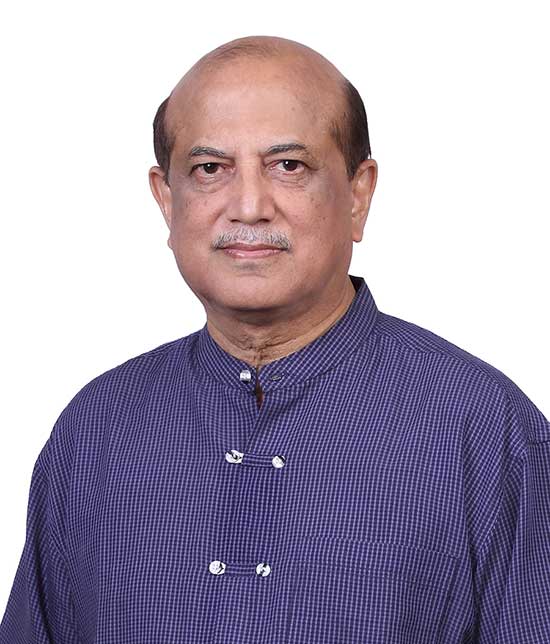
The US-based Ronald McDonald House Charities (RMHC) has nominated BRAC vice chairperson Ahmed Mushtaque Raza Chowdhury for its 2017 “Medical Award of Excellence”.
The award will be given at a gala to be organised in Chicago, USA on 11 November.
The organisation informed Dr Mushtaque of his selection on Wednesday (6 November). The award is given for outstanding contribution to improve the health and wellbeing of children. To honour the awardee, RMHC will present a grant of US$ 100,000 to a non-profit organisation selected by the awardee.
The BRAC vice-chair is also a professor of Columbia University and a board member of South Asia Centre of London School of Economics. He is also the president of Asian Action Alliance for Human Resources in Health (AAAH) and lead group member of UN’s Scaling Up Nutrition (SUN) Movement.
Among the previous winners of the Medical Award of Excellence are former US president Jimmy Carter, former US first ladies Barbara Bush and Betty Ford, health minister of Rwanda Dr Agnes Binagwaho and Queen Noor of Jordan.
Currently, the charity is working in more than 64 countries and regions in the world to ensure children’s healthcare and wellbeing.
The next generation of business women in Liberia
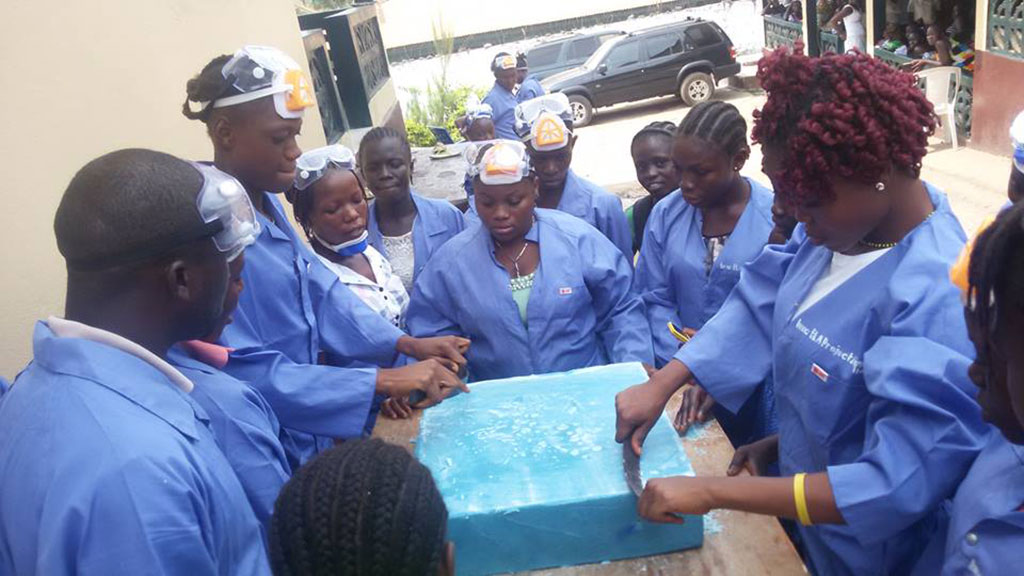
BRAC in Liberia and the Dutch organisation, Mineke Foundation, joined forces to bring vocational training to girls’ club members. The programme trains them on income generating activities. Young women aged 15-25 participated in a 3-month training in soap making, baking and catering management.
14 out of the 50 first batch of graduates started their own business during their training. Previously, these women had no source of income. They are now earning between $2.50 to $50 a week.
The Mineke Foundation works in Dabwe Town and its surrounding communities, which are all situated near the capital Monrovia. Their goal is to scale up the fieldwork throughout Liberia. Mineke Foundation provides the trainers and BRAC facilitates the vocational training. The trainees are all graduates of the programme itself; they are able to generate additional income.
Training of business leaders
Mineke Foundation and BRAC started two new vocational training groups at the end of July 2017, with one in Gbarnga (Bong County) and one in Sinjeh (Grand Cape Mount Country). An estimated 25 leaders from the local girls’ clubs in each province will receive vocational training so that they can train students in their respective clubs.
Join the world’s biggest family

